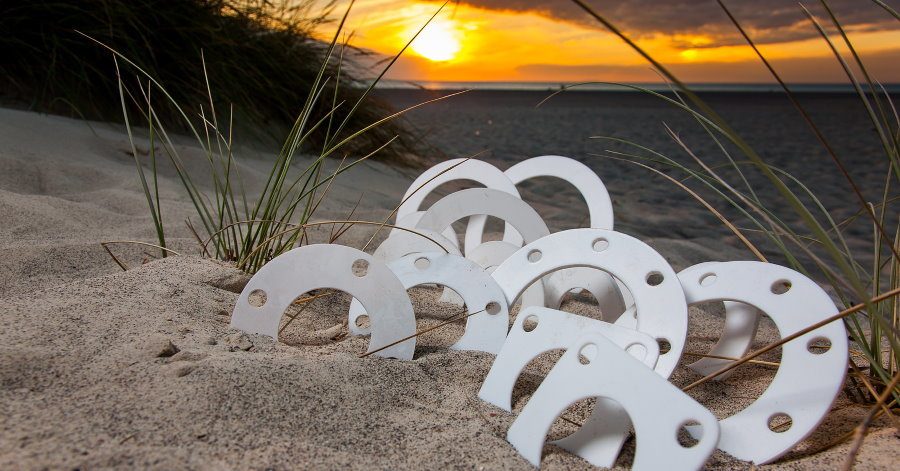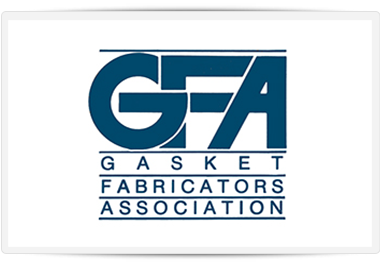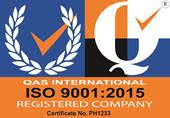Die-cut rubber gaskets are used for a vast array of applications, especially sealing water. However, not all die-cut gaskets are created equally. When choosing the best die-cut gasket or seal, there are a number of different considerations that should be made.
One of the top considerations is the type material and the characteristics it offers your custom gaskets. Fortunately, the team at Frank Lowe can help. We offer decades of experience creating die-cut gaskets from rubber and other types of nonmetallic gasket material.
As such, we have gained volumes of in-depth knowledge and understanding of each type of custom die-cut rubber material. Continue reading for an overview of the most common types of rubber materials used in die-cut gaskets, ring joints, and other parts.
Silicone Rubber Die Cut Gasket and Seal
Gaskets and seals manufactured from silicone rubber will retain excellent elastomeric properties at both low and high temperatures. Gaskets made of silicone rubber boast excellent resistance to weathering, aging, and ozone
At the same time, silicone rubber die-cut gaskets can be further customized and formulated to meet a range of different specifications. However, these gaskets shouldn’t be exposed to silicone fluids, solvents, or fuels. Common products that use silicone rubber include:
Die Cut Neoprene Rubber Gaskets and Seals
As one of the first oil-resistant synthetic rubbers, die-cut neoprene rubber seals and gaskets are also referred to as polychloroprene rubber gaskets. No matter the name, neoprene rubber gaskets are moderately resistant to ozone, oxygen, UV, petroleum, and moderately high-temperature environments.
Neoprene is known as a general-purpose elastomer with a low compression set, good resilience, and good abrasion. At the same time, die-cut neoprene gaskets are resistant to flex cracking.
With remarkable elasticity and flexibility, die-cut neoprene seals are able to snugly fit between gaps of components to form a fluid-tight seal. In general, there are four primary types of neoprene material used for gaskets:
In addition, each of these types of neoprene materials are offered in different densities, strengths, and other properties.
Die Cut Polyurethane Rubber Gasket
Polyurethane is a compound that offers excellent tensile strength and abrasion resistance. In fact, die-cut polyurethane rubber gaskets and seals are recognized as the most abrasion-resistant and toughest of all.
Polyurethane boasts the elasticity of rubber paired with the durability of strength. These exceptional qualities usually translate into an excellent performing rubber gasket material in all weather conditions. Polyurethane also offers excellent low and high-temperature performance: offers strong resistance to:
Ethylene Propylene Diene Monomer (EPDM) Die Cut Gasket
As a popular and versatile die-cut gasket, die-cut EPDM seals are extremely resistant to sunlight and high levels of heat. These gaskets can help stabilize color in the harshest of weather conditions, which makes them a highly sought-out material for outdoor applications.
EPDM rubber die cut gaskets are abrasion resistant and formulated to resist harsh chemicals, such as alkalis and acids. These die gut gaskets are ideal for applications involving petroleum and hydrocarbon oils, which usually cause other gasket materials to swell.
Die Cut Nitrile or Buna-N Types of Rubber Gaskets
Nitrile — also known as Buna-N — is a very versatile rubber material. It's utilized in countless products and applications ranging from small engine carburetors to marine systems. In addition, die-cut nitrile rubber gaskets are widely used because of their ability to resist:
Die Cut Styrene-Butadiene Rubber (SBR) Seals and Gaskets
As a copolymer of styrene and butadiene, red rubber or styrene-butadiene rubber (SBR) gaskets boast similar characteristics to natural rubber. Because of this, die-cut SBR gaskets are often substituted as a cost-effective alternative.
Die-cut SBR seals can resist cold water, hot water, low-pressure steam, gas, and air. These gaskets also have excellent impact strength, remarkable abrasion resistance, and conform easily to uneven flange surfaces.
In addition, SBR gaskets offer good resilience and high tensile strength. However, gaskets made from red rubber or SBR aren't best suited for use with solvents, oils, fuels, or hydraulic fluids.
Die Cut Viton Rubber Gaskets
The fluorocarbon elastomer Viton is a high-performing rubber compound renowned for its ability to resist extreme chemicals, concentrated acids, oils, aggressive fuels, and heat. In fact, Viton rubber gaskets can resist high temperatures of up to 500° F.
In addition to providing heat resistance, Viton is also resistant to mold, fungus, most mineral acids, alkalis, sun, weather, oxidation, and more. At the same time, gaskets cut from Viton rubber gaskets offer resistance to compression sets over long periods of time at high temperatures.
Contact Frank Lowe for Die Cut Rubber Parts & Gasket
As the leading fabricator, we offer a wide variety of die-cut gaskets that can be cut from virtually any nonmetallic material. We even offer different grades of mil-spec rubber for specialized die cutting.
Based on our decades of experience, we confidently meet applications with tight tolerances and leverage a range of different die cutting techniques, such as rotary die cutting, water jet cutting, and more. We offer the capabilities to manufacture gaskets and components for everything from OEM products for prototyping to large production runs.
Whether you need quick-cut options for high-pressure applications or assistance selecting adhesives for mating two different surfaces, we offer the custom manufacturing expertise to meet your needs and exceed your expectations. And we will guide you through the process and ensure the type of rubber die cut gaskets you choose best meets the applications.
Contact Frank Lowe today.






